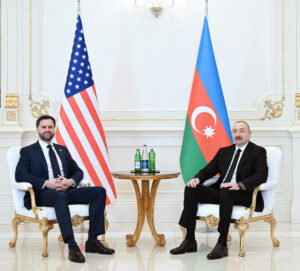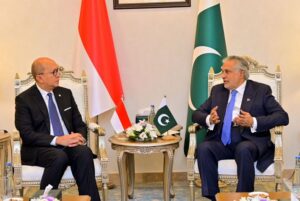Deepening Pakistan-Tajikistan Relations

The diplomatic relationship between the Republic of Tajikistan and the Islamic Republic of Pakistan was officially established on June 6, 1992.
Pakistan was among the first countries to recognize Tajikistan’s independence, opening its embassy in Dushanbe in 1994. Over the past three decades, both nations have worked to deepen their bilateral ties.This relationship has seen significant development in trade, connectivity, security cooperation, and strategic partnerships, indicating a promising future for both countries.
The meeting signalling a new age of collaboration and mutual prosperity in the Pakistan-Tajikistan relationship, which has been steadily expanding. Geographically, Tajikistan’s location as the gateway to Central Asia through the Wakhan Corridor positions it as a crucial link between East and West. This unique location holds tremendous potential for enhancing connectivity, trade, and cultural exchange, ultimately facilitating the development of the entire Eurasian region.
In recent years, Pakistan and Tajikistan have pledged to strengthen their trade and connectivity. During PM Shehbaz Sharif’s visit to Tajikistan (July 1–2), Pakistan’s Prime Minister Shehbaz Sharif and Tajik President Emomali Rahmon signed several agreements and numerous memoranda of understanding (MoUs) on sectors such as agriculture, education, health, and infrastructure development. These agreements aim to enhance cooperation in various sectors and promote mutual economic growth. The strategic partnership between the two nations is expected to facilitate the transportation of goods from the port of Karachi to Tajikistan via Afghanistan, highlighting the economic significance of this route.
Security and Military Cooperation
In June 2021, both countries signed memoranda of understanding (MOU) for the sale of Pakistan-manufactured arms to Tajikistan. Security cooperation between Pakistan and Tajikistan flourished. Pakistan and Tajikistan have collaborated closely to address security challenges. Joint military exercises, training programs for Tajik security forces, and intelligence sharing are some of the key aspects of the counter terrorism cooperation.
Economic and Business Cooperation
One of the significant pillars of Pakistan-Tajikistan relations is economic cooperation. Both countries have expressed a strong commitment to enhancing bilateral trade. Pakistan has emphasized the importance of connectivity projects such as the China-Tajikistan-Afghanistan trade corridor. This project aims to broaden multilateral trade in the region, providing a strategic route for the transportation of goods. Additionally, the operationalization of the Gwadar seaport offers Tajikistan access to efficient, economic routes to the Middle East and beyond, further enhancing regional connectivity.
The establishment of the Pakistan-Tajikistan Business Forum aims to catalyze trade and investment relations, encourage business-to-business interactions, and foster entrepreneurship. In July 2023, the Global Business Alliance of Pakistan (GBA) and LLC “Somon Travel” of Tajikistan signed a Memorandum of Cooperation to develop tourism and business relations. This partnership underscores the importance of cultural exchange in enhancing bilateral ties and creating new opportunities for tourism and investment in both countries.
Regional and global cooperation
Pakistan and Tajikistan have actively participated in regional and global forums to promote peace, stability, and sustainable development. Both nations have cooperated in international and regional organisations such as the United Nations (UN), the Shanghai Cooperation Organisation (SCO), the Organisation of Islamic Cooperation (OIC), and the Economic Cooperation Organisation (ECO). This multilateral cooperation underscores their commitment to addressing global challenges and promoting regional stability.
A significant project bringing Tajikistan and Pakistan closer is the CASA-1000 project, primarily coordinated by Tajikistan, Kyrgyzstan, Afghanistan, and Pakistan. The main goal of CASA-1000 is the generation and transmission of hydroelectricity from Central Asia to South Asia.
The project includes the construction of 1,222 km of transmission lines and stations, technical and financial assistance through joint commissions, and support for communities along the project route.
Pakistan has also expressed strong support for Tajikistan’s leadership in global water diplomacy. Tajikistan’s initiatives, such as the UN 2023 Water Conference and the Dushanbe Water Action Decade Conference, highlight its commitment to sustainable water resource management. A high-level Pakistani delegation regularly participates in these conferences, offering practical recommendations for achieving sustainable development goals related to water resources.
Pakistan and Tajikistan are undertaking various initiatives to connect South and Central Asia, enhancing regional connectivity and cooperation, and bolstering security to foster prosperity and peace in the region
Future Prospects
The deepening of Pakistan-Tajikistan relations is built upon a comprehensive strategy that encompasses economic cooperation, educational interactions, cultural exchange, and a united front in addressing common challenges. Both nations are elevating their friendship to high levels.
As Pakistan and Tajikistan work together for mutual advancement, they pave the way for a prosperous future. Enhanced cooperation in trade, investment, energy, and infrastructure will open new possibilities, stimulate innovation, and promote inclusive growth. The enhancement and operationalization of regional trade and economic corridors will further solidify their partnership, and the future holds enormous promise for Pakistan and Tajikistan. Their combined efforts will contribute to the development of a thriving and connected Eurasia, fostering regional stability and prosperity. The strategic relationship between Pakistan and Tajikistan serves as a model for bilateral cooperation, demonstrating the potential of mutual collaboration in achieving shared goals and addressing global challenges.


